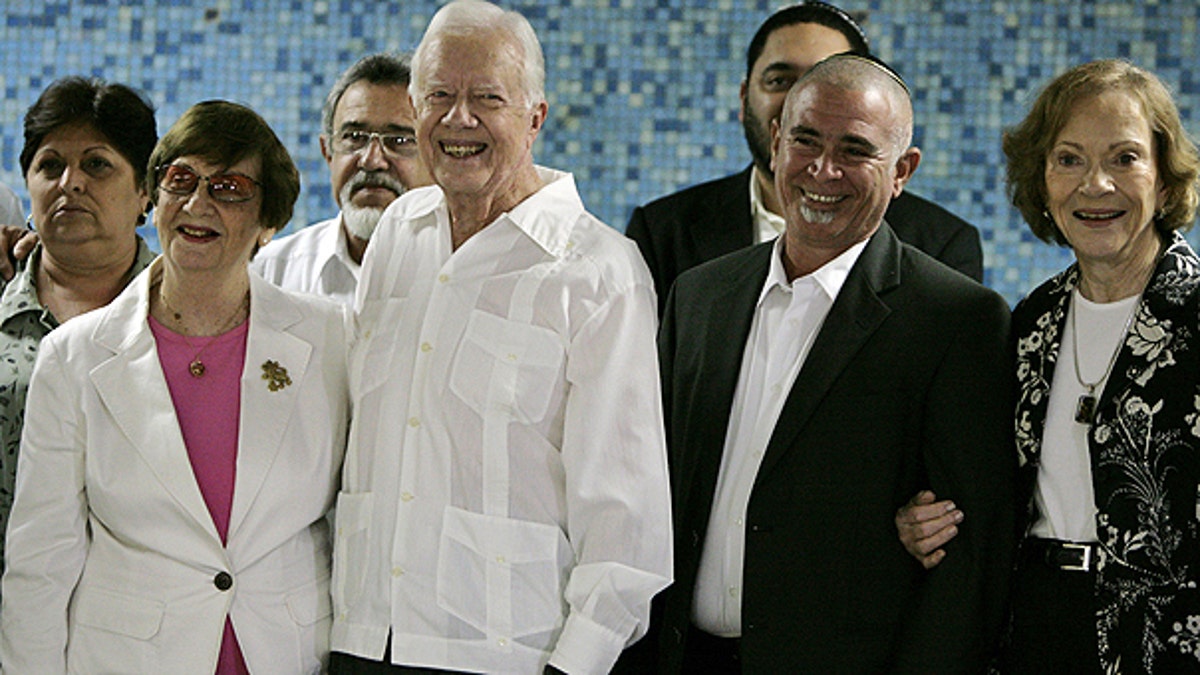
March 28: Authorities, front row, from left, Adela Dworin, President of the Cuban Jewish Community, former President Jimmy Carter, David Prinstein, Vice-President of the Cuban Jewish Community and Carter's wife Rosalynn Carter, pose for pictures during a visit to members of the Cuba Jewish Community in Havana, Cuba. (AP)
HAVANA – Former President Jimmy Carter met with religious leaders in Cuba on Monday as he began a trip to discuss economic policies and ways to improve Washington-Havana relations, which are even more tense than usual over the imprisonment of a U.S. contractor on the island.
Carter met in the afternoon with leaders of Cuba's Jewish community but did not say whether he mentioned the case of Alan Gross, who was arrested in December 2009 while working on a USAID-backed democracy-building project he said was meant to help improve internet access for that community.
Cuba says such USAID programs are aimed at overthrowing the government of President Raul Castro.
Emerging from Havana's Temple Beth Shalom, in dark slacks and a white guayabera shirt, Carter did not take questions from reporters, but said there would be a news conference on Wednesday.
Adela Dworin, president of the temple and Cuba's largest Jewish organization, the Jewish Community House, said the Gross case did not come up during Carter's visit and their conversation focused on the Jewish community in Cuba.
"We did not talk about politics," Dworin said.
Jewish leaders here have denied dealing with Gross, who was working for Bethesda, Maryland-based Development Alternatives Inc.
He was convicted and sentenced to 15 years in prison earlier this month for crimes against the state for the illegal importation of telecommunications equipment into the country.
Carter later met for about an hour with Roman Catholic Cardinal Jaime Ortega, who helped broker a deal under which Cuba recently freed the last 52 of 75 dissidents who were arrested in a 2003 crackdown and given lengthy prison sentences on charges such as treason. The government considers dissidents to be common criminals financed by the United States.
Many of those freed went into exile, but some have remained on the island and vow to continue their activities. Dozens of other prisoners convicted of violent but politically motivated crimes have also been released.
"Mr. Carter expressed to Cardinal Ortega his pleasure at the process of dialogue that the Church in Cuba conducts with the government of President Raul Castro Ruz, one the results of which has been the release of more than 100 Cuban prisoners," the archdiocese of Havana said in a statement.
Carter is expected to meet with Castro and other government officials before leaving Wednesday.
Earlier Monday, Cuban Foreign Minister Bruno Rodriguez and the head of the U.S. diplomatic mission in Cuba, Jonathan Farrar, welcomed Carter and his wife, Rosalynn, as they arrived at the capital's airport.
The state-run newspaper Granma noted the visit in a brief front-page article, calling Carter a "distinguished visitor" invited by the Cuban government.
The trip is under the auspices of the Carter Center and is not an official U.S. mission.
Still, both the State Department and Gross' family have expressed hope that it may help facilitate the contractor's release.
"We have repeatedly urged the government of Cuba to release Mr. Gross and we encourage others who meet with Cuban officials, including President Carter, to also voice their concerns and make this request," State spokesman Mark Toner said last week.
"If he is able to help Alan in any way while he is there, we will be extraordinarily grateful," Gross's wife Judy E. Gross said in statement over the weekend. "Our family is desperate for Alan to return home, after nearly 16 months in prison. We continue to hope and pray that the Cuban authorities will release him immediately on humanitarian grounds."
Cuba calls Gross a mercenary working on a program paid for by Washington that aimed to bring down Cuba's socialist system, and it has presented him as evidence of U.S. intentions to unleash a "cyberwar" to destabilize the island.
U.S. officials say no rapprochement between the Cold War enemies is possible while Gross remains jailed.
Carter's 1977-1981 presidency coincided with the least-chilly period of U.S.-Cuban relations since shortly after Fidel Castro led his rebels to power in 1959.
During the Carter administration the two nations opened interest sections, which some countries maintain instead of embassies, in their respective capitals.
Washington and Havana have not had formal diplomatic relations since the 1960s, and the United States maintains economic and financial sanctions on the island.
Carter visited Cuba in May 2002 on a six-day tour during which he met with then-President Fidel Castro and criticized both Washington's embargo and the lack of political plurality on the island.
___
Associated Press writer Andrea Rodriguez in Havana contributed to this report.
